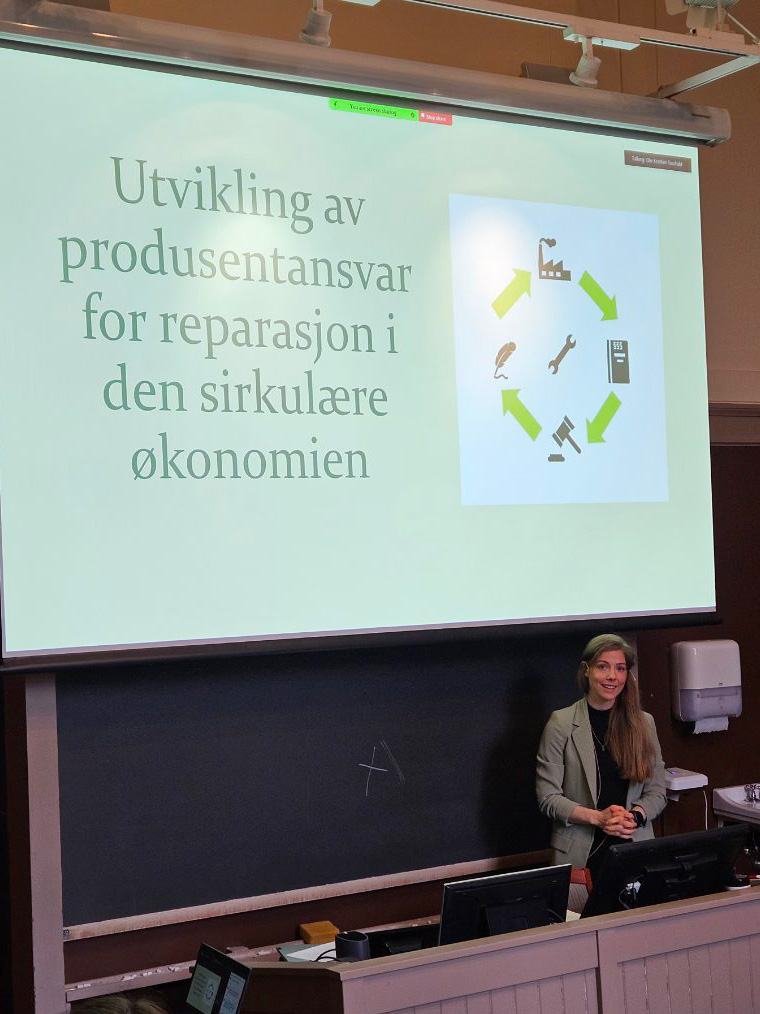Founded in 2017, The Norwegian Association for Environmental Law (Norwegian: Norsk forening for miljørett) aims to promote knowledge about and interest in environmental law through meetings, discussions, and the exchange of information. On 7 May 2024, the annual meeting, the members meeting, and the announcement of the 2023 student prize took place.
The student prize is awarded for a thesis that provides a significantly valuable contribution and aims to highlight students' important contributions and insights in the field. This year, Kirsten Daae Wiig, a master's student in law, has been honored as the first-ever recipient of the association’s student prize:
– First and foremost, I feel incredibly grateful and happy. It's exciting that skilled lawyers highlight the thesis in this way, and it's great to have the opportunity to talk about it in connection with the association's annual meeting. I hope other students will be inspired to write their master's thesis on environmental law, says Wiig.
Producer responsibility for repair can contribute to a green circular economy
In her master's thesis titled ‘Developing producer responsibility for repair in the circular economy’, Wiig explains that she has examined how legal standards can be a way to anchor producer responsibility for repair, using the duty of care in the Norwegian Product Control Act as a case study:
– The reason I chose this research question is because I wrote my thesis as a research assistant in the thematic research group ‘Circular Energy for a Sustainable Circular Economy’. Sustainable production and consumption were central themes in the group's research. In addition, repair regulation is on the agenda both nationally and internationally. The government, for example, has stated that they want to be a pioneer in the development of a circular economy in the national strategy for a green, circular economy.
Wiig elaborates on the significance of repair in transitioning from a throwaway society, but states that there is still much to be done for repair to be the primary choice when items get broken:
– I have personally experienced how difficult it is to get things like cell phones or headsets repaired. There were several factors that led me to focus on producer responsibility for repair in my thesis, and I hope that the thesis can show the authorities that Norway, too, can be a driving force in the development of a sustainable, circular economy if they follow up their words with actions, says Wiig.
Active participation in the research group
Wiig worked as a research assistant in the research Group Sustainability Law at the Department of Private Law, and the thesis was part of the thematic research group ‘Circular Energy for a Sustainable Circular Economy’ (2021-2023) funded by UiO:Energy & Environment. She explains how this was a particularly enriching experience:

– I feel lucky to have had the opportunity to get to know, learn from, and receive help from so many talented people. It has also allowed me to develop a lot during the writing process, particularly in terms of independent and critical thinking. Notably since the thesis aimed to contribute to the research of both groups by providing clarifications in an area where there is both significant development and has limited existing literature.
Wiig's supervisor and former Postdoctoral Fellow at the Department of Private Law, Eléonore Maitre-Ekern, also expresses her joy:
– I am extremely happy for her. She certainly deserves it, both because she has put a lot of efforts into it, but also because she had a topic and an approach that was particularly challenging to work with, and she truly made the most out of it!
Maitre-Ekern emphasizes how the topic Wiig highlights in her thesis is valuable in light of sustainable development in society:
– I am also thrilled that the topic gets exposure through this prize. The transition to a sustainable circular economy requires substantive change of business models, with a strong focus on repair, and the law has a key role to play in shaping and accompanying this transition. In addition, Kirsten shows something very important; that we don't need to always re-invent the wheel. Sometimes, it is about making sure to use the wheel in the best possible way.
The road ahead
Wiig is currently in the midst of her exam period, but has already secured a job and will participate in the Nordic Human Rights Moot Court Competition in June:
– I think the Moot Court Competition will be a very fun and enriching experience, so I'm looking forward to it. After that, I will have my summer vacation before starting as a trainee lawyer at Alver in the fall, finishes Wiig.
